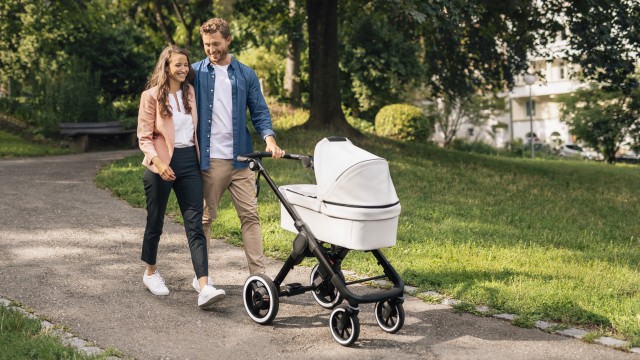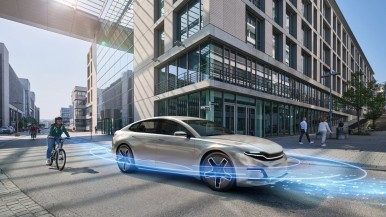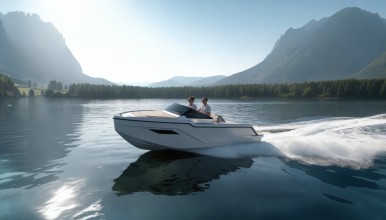Bühl, Germany – Measuring a seven on the Beaufort scale, the air in the wind tunnel blasts the stroller at a speed of 60 kph. Its hood may be flapping wildly, but the stroller doesn’t budge. This isn’t because its parking brake is on, or because someone is holding it still. It’s all thanks to the new Bosch e-stroller system. This is much more than an electrical drive – it is an assistance system for strollers with a comprehensive range of comfort and safety features: in addition to offering push support and an automatic braking function, this includes connectivity via a smartphone app, an alarm function, and a variety of high-tech sensors. This new system marks Bosch’s entry into a new market. “The e-stroller system incorporates know-how from across the company. We’ve applied the same rigorous technology and quality standards here as we do in the automotive sector, including wind tunnel tests,” says Dr. Stefan Hartung, member of the board of management and chairman of the Mobility Solutions business sector. The variable Bosch system is equally suitable for single, twin, or sibling strollers. It will have its market launch in early 2020 with the Swedish stroller manufacturer Emmaljunga. Collaboration with additional manufacturers is planned.
Mobility is the largest Bosch Group business sector. It generated sales of 55.8 billion euros in 2024, and thus contributed around 62 percent of total sales. This makes the Bosch Group one of the leading mobility suppliers. Bosch Mobility pursues a vision of mobility that is safe, sustainable, and exciting. For its customers, the outcome is integrated mobility solutions. The business sector’s main areas of activity are electrification, software and services, semiconductors and sensors, vehicle computers, advanced driver assistance systems, systems for vehicle dynamics control, repair-shop concepts, as well as technology and services for the automotive aftermarket and fleets. Bosch is synonymous with important automotive innovations, such as electronic engine management, the ESP anti-skid system, and common-rail diesel technology.
The Bosch Group is a leading global supplier of technology and services. It employs roughly 412,000 associates worldwide (as of December 31, 2025). According to preliminary figures, the company generated sales of 91 billion euros in 2025. Its operations are divided into four business sectors: Mobility, Industrial Technology, Consumer Goods, and Energy and Building Technology. With its business activities, the company aims to use technology to help shape universal trends such as automation, electrification, digitalization, connectivity, and an orientation to sustainability. In this context, Bosch’s broad diversification across regions and industries strengthens its innovativeness and robustness. Bosch uses its proven expertise in sensor technology, software, and services to offer customers cross-domain solutions from a single source. It also applies its expertise in connectivity and artificial intelligence in order to develop and manufacture user-friendly, sustainable products. With technology that is “Invented for life,” Bosch wants to help improve quality of life and conserve natural resources. The Bosch Group comprises Robert Bosch GmbH and its roughly 490 subsidiary and regional companies in over 60 countries. Including sales and service partners, Bosch’s global manufacturing, engineering, and sales network covers nearly every country in the world. Bosch’s innovative strength is key to the company’s further development. At 136 locations across the globe, Bosch employs some 82,000 associates in research and development.
Additional information is available online at www.bosch.com, www.bosch-press.com.








